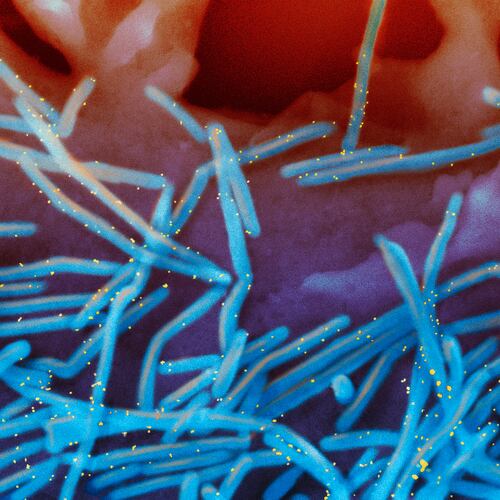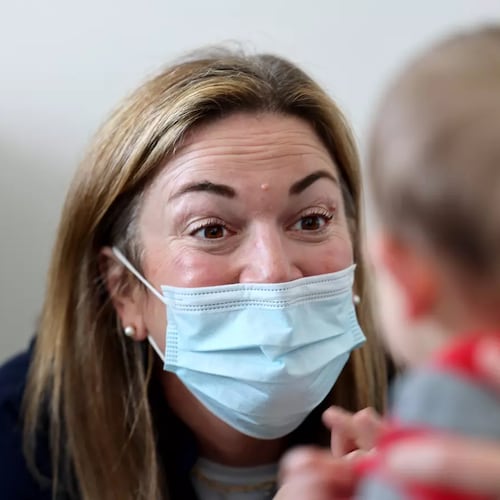COVID-19 continues to ramp up in Georgia and across the country and this latest spike in infections is expected to trigger the biggest summer wave in two years, according to available data from the Centers for Disease Control and Prevention and public health experts.
COVID infections are growing or likely growing in 25 states, including Georgia, according to the CDC. The CDC no longer tracks COVID case numbers but estimates the trend of the virus spread based on emergency room visits.
Because so few COVID tests are reported now, the level of virus shed in sewage is considered one of the best measurements to track spread within communities. Both nationally and in Georgia, the wastewater viral activity level for COVID is classified as “very high” by the CDC. The current viral activity level in Georgia’s wastewater is more than twice what it was this time last year.
Jodie Guest, senior vice chair in the department of epidemiology at Emory University’s Rollins School of Public Health, said while viral levels are “extremely high,” they are not quite at the levels seen in Georgia and U.S. during the summer of 2022 but are on a trajectory to surpass that in coming days. Based on the wastewater data and other trend data such as an uptick in ER visits, she said all indications point to a summer surge that will “likely be the largest summer wave in two years.”
Wastewater viral activity levels between 4.5 and 8 are considered high and above 8 is considered very high. During the peak of 2022, the level reached 14.2 in Georgia, according to CDC data. As of Aug. 10, wastewater levels in Georgia were at 9.2. Nationally, wastewater levels are 8.8, closer to summer 2022′s peak of 9.6.
Last week, 2.5% of emergency room visits in Georgia were related to COVID, up from less than 1% at the beginning of July. This is still considered “low” by the CDC.
The CDC also still tracks ER visits along with COVID deaths, which are well short of where they were during past surges. In January 2022, 10% of emergency room visits in Georgia were related to COVID, the CDC reported.
“The most important takeaway is that there is a lot of COVID out there and people should test if they have symptoms to help contain the spread. A new vaccine will be available soon,” said Guest.
The Food and Drug Administration approved the latest, updated COVID vaccines targeting more recent strains of the virus Thursday. Guest said the vaccines should be available in local pharmacies within the next few days.
“We need to remember that being up to date on your COVID vaccine is the best way to prevent severe disease and deaths,” Guest said.
Many doctors say those eager to get another dose of the COVID vaccine should wait a bit longer until they can get the newest one. It’s also worth taking extra precautions such as wearing a mask in crowded situations and paying attention to COVID-like symptoms.
“I do think it is time for people to strongly consider wearing masks at airports and crowded indoor venues,” said Dr. Jayne Morgan, a cardiologist formerly of Piedmont Healthcare who recently took a job as vice president of medical affairs of Hello Heart, a Menlo Park, Calif.-based company founded in 2013 that offers Bluetooth-enabled blood pressure monitors to help reduce the risk for heart attacks and strokes.
She also said it’s time to change the timing of the rollout.
After yet another summertime roller coaster of cases going up and up before suddenly falling down again, she said the FDA should move up the window when updated vaccine formulas are approved so they can be available before kids return to school. A new vaccine released after classes have resumed is usually too late to contain the summer spike.
Credit: John Spink
Credit: John Spink
Another sign of widespread circulation is looking at the “R number,” which is a way epidemiologists rate a virus’ ability to spread. The R number represents how many new infections are estimated to stem from a single case. For example, if the R number is 3, then one person with the disease is expected to infect, on average, 3 others. An R number below 1 suggests the number of infections is falling.
The R number for the U.S., while still above 1, has been slipping ever so slightly over recent weeks. But in Georgia, the R number has stayed right around 1.11 for the past month.
But while this latest swell of cases is causing massive sickness and upending plans and disrupting everyday life, people today are less likely to suffer severe illness from COVID. Most people have some immunity from past infections, vaccines or both. Treatments are also available. But COVID remains a threat, especially for those who are older and who have weakened immune systems.
Editor’s note: This file has been updated to reflect the FDA’s approval on Thursday for the updated vaccine formulas.
Keep Reading
The Latest
Featured






